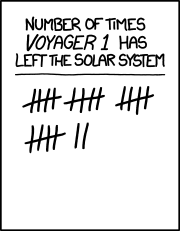Parrothead wrote:pumpkinpi wrote:No it hasnt . When it passes the Oort Cloud in 30,000 years it will have left the Solar System.
Damn these reporters!
Voyager 1 has left the heliosphere! (?)

Rommie does that scratchpad you posted include the latest or not?
It's not just the reporters conveying the wrong information, it's many scientists too.
But so says the scientist turned reporter BA:
But does this mean it has left the solar system? Well, no. That might seem odd since I just said it’s in interstellar space, but that’s only when you look at the Sun’s influence on the particles out there.
However, there’s more to our solar system’s far-flung suburbs than errant electrons and protons. Even out there, over 120 times farther from the Sun than the Earth’s orbit, there are more substantive objects: huge, frozen chunks of ice that are essentially giant comets. The Sun is surrounded by trillions of these iceballs, a countless swarm of them called the Oort Cloud. They take thousands of years to orbit the Sun even once, but enthralled to its gravity they are.
When I zoom my planetarium audience out of the solar system, I have visualizations of both the Voyager (and Pioneer) trajectories and the Oort cloud. It would make no sense for me to say once we pass Voyager we are out of the solar system, then go way past that and through the Oort Cloud and tell them the comets orbit the Sun. They would say I'm crazy.
Another way to think about it: are the Oort Cloud comets not in the solar system until they change orbit and come within the heliopause?
Too bad ignorance isn't painful.
"Standing at the forefront of human ignorance." Daniel and Jorge Explain the Universe




